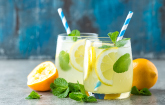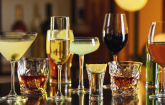SALT LAKE CITY, Dec. 12, 2016 /PRNewswire/ -- Holidays are all about celebrating with new and old friends; however, they can also lead to hangovers…they are bound to happen. What if you knew better? Dr. Brian Dixon, executive director of Health and Science Education at USANA shares what you could do to have fun but, not suffer the next day. While the only way to prevent a hangover is not drinking alcohol at all, you don't have to give up entirely, just be smart how you do it. Below are 4 things that you can do help prevent that unpleasant drinking aftermath.
DON'T DRINK ON AN EMPTY STOMACH!
You should eat before your drink. Why? Alcohol is one of the few compounds that can be absorbed directly through your stomach wall, which means that if you drink a glass of wine on an empty stomach, the alcohol gets into your bloodstream quickly, says Dr. Dixon. That's why it's a good idea to eat before you start drinking. Just having food in your stomach will slow down the absorption of booze into your bloodstream, as well as keep your blood sugar levels steady. Make dinner beforehand-a balanced one with protein (lean beef, fish, or chicken), healthy fats (avocados, olives), and starches (brown rice), and continue to snack healthily throughout the night.
DRINK LOTS OF WATER!
Alcohol is a diuretic, which means it dehydrates you, says Dr. Dixon. Drinking water while you drink will help you stay hydrated, which will minimize your hangover symptoms the next morning. "A good rule of thumb is to have a glass of water in between every drink," Dr. Dixon says. And if you can manage it, have a big glass before you go to bed as well.
KEEP IT LIGHT!
Sounds strange, but the darker your beverage, the more severe your hangover is likely to be. The same additives that give liquors like bourbon and whiskey their trademark mahogany colors and sharp flavors also add to your pounding head and queasy stomach the morning after. According to Dr. Dixon, the color in high-end alcohol brands tends to be derived from naturally occurring chemicals (called congeners—things like as amino acids, tannins, and other chemicals) from the wood that the alcohol is aged in. But lower-end brands will just add cheap fillers, additives, and preservatives to maintain the color, which can potentially worsen your hangover. "Our bodies are amazing at sensing whenever they're exposed to any kind of foreign chemicals," Dr. Dixon says. "Think of your body's detoxification system like an assembly line: That line can only move so fast in processing chemicals, including ethanol. And when it gets backed up, it'll create a domino effect on your body's ability to filter things out." That said, light-colored drinks won't prevent hangovers. The bottom line is that if you drink too much alcohol—no matter what color it is—you probably won't wake up feeling great.
NUMB THE PAIN!
This is the hangover myth that just doesn't seem to die, but it is absolutely a mistake, Dr. Dixon says. "The only reason it works is because it might numb the pain." Instead of reaching for another boozy beverage, which will only prolong your symptoms in the long run, try replenishing with your favorite sports drink, some soup, or even a cup of coffee with cream and sugar. (Dr. Dixon says the data's a bit mixed, but caffeine might help with your headache, so it couldn't hurt to try.) Because people's blood sugar tends to crash after a night of heavy drinking, Dr. Dixon also recommends reaching for something with simple sugars (think a bagel or cereal) in the morning to quickly boost your blood glucose levels, though he cautions that once you're feeling a little better, you should eat something healthier.
SLEEPLESS NIGHT!
If you've ever split a bottle of wine with friends and then lay in bed wondering why you couldn't fall asleep—or wake up feeling tired—you can blame it on the ethanol. It is well-known for disrupting the quality of your sleep, so even if you pass out as soon as your head hits the pillow, don't be surprised if you jolt awake suddenly in the middle of the night and can't fall back asleep. The bad news is that a lack of sleep simply magnifies your symptoms. "A lot of detoxification happens when you're sleeping, so you can see how you get a snowball effect when you've been drinking," Dr. Dixon says. "It's fun but really so unhealthy for our bodies when you really dig into it."
About Dr. Brian Dixon
Dr. Dixon earned his PhD in molecular and cellular biology from Oregon State University in affiliation with the Linus Pauling Institute. Dr. Brian Dixon joined USANA's department of research and development in January of 2009. As an integral member of USANA's scientific staff, Dr. Dixon's main role was to facilitate and manage all human clinical studies conducted at, and funded by, USANA. In November of 2014, Dr. Dixon was asked to head up the newly formed department of health and science education as its executive director. He continues to lecture internationally on the importance of nutrition for optimal health and manages the very popular website AskTheScientists.info where the public can find science-based answers to questions on health and nutrition.
Media Contact: Ashley Collins
Executive Director of Public Relations and Social Media
(801) 954-7629
media(at)us.usana(dot)com
SOURCE USANA
Related Links
WANT YOUR COMPANY'S NEWS FEATURED ON PRNEWSWIRE.COM?
Newsrooms &
Influencers
Digital Media
Outlets
Journalists
Opted In






Share this article